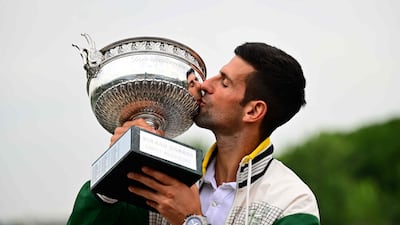The 127th edition of the French Open concluded on Sunday evening with Novak Djokovic creating more history and 24 hours after Iga Swiatek reaffirmed her dominance of the women's game.
As the tour makes its way to the brief grass-court swing, here are some of the biggest takeaways from Roland Garros.
No surprises in the winners' circle
After more than two weeks of tennis under oftentimes oppressive Paris heat, there were no surprises as to the champions of the men's and women's singles titles, despite there being a few pre-tournament doubts.
Swiatek was, by her incomparable standards, in solid form ahead of her French Open title defence with one clay-court title in Stuttgart and a run to the Madrid Masters final. But a retirement in the Rome Masters semi-finals raised a few fitness concerns.
Once the Polish top seed got under way in Paris, though, there was only going to be one outcome. Of the 12 completed sets she played en route to the title, Swiatek won four of them 6-0 and was only taken the distance once, in the final against Karolina Muchova. At 22 years old and with four Grand Slam titles already, Swiatek is well on her way to a glittering career.
Only another 19 to go to match the men's major record set by Djokovic on Sunday. The Serb surpassed long-time rival Rafael Nadal – absent with injury – by collecting his third Roland Garros title. By doing so on the court Nadal has made his own fortress – home to 14 of his 22 majors – added a hefty dose of irony.
Djokovic's form was decidedly mixed heading to Paris; a quarter-final in Rome his best showing on clay, while a minor injury had ruled him out of Madrid. But there is, officially, no better player in history in Grand Slam's best-of-five format nor at handling the pressure of the big tournaments, and Djokovic displayed all of his class and experience to collect major title No 23 and return to world No 1.
Having clinched a record-extending 10th Australian Open trophy in January and now installed as overwhelming favourite to defend his seventh Wimbledon crown, talk of the calendar Grand Slam is very much on.
Ruud's revival
Casper Ruud enjoyed a superb breakthrough season in 2022, reaching two Grand Slam finals and reaching No 2 in the world rankings. During a visit to Abu Dhabi for the Mubadala World Tennis Championship in December, the Norwegian spoke of his desire to start fast this season and build on his momentum. To put it mildly, that did not happen.
It took until April for Ruud to win two matches in a row, when he won the title in Estoril, but he continued to struggle against top opposition in the bigger clay-court events leading up to the French Open.
The 24-year-old was certainly not in the discussion to reach the final in Paris, yet he rediscovered close to his best form just when it mattered, with impressive wins over the likes of talented youngster Holger Rune and Olympic champion Alexander Zverev. Djokovic proved a step too far but there's no shame in that.
As one of the most likeable players on tour, it's good to see Ruud back to his best.

Women forced to play second fiddle
One of the biggest talking points from the 2023 French Open concerned the schedule. Each day, the night session match is promoted as the highlight of the day, yet Aryna Sabalenka's fourth-round match against Sloane Stephens was the only women's match to be afforded such billing.
World No 3 Jessica Pegula described the imbalance in prime-time scheduling as “disappointing”, and while tournament director Amelie Mauresmo insisted the order of play and become “more balanced”, she admitted “we can do better on the night matches”.
How the French Open, and indeed the other three Grand Slams, addresses this imbalance moving forward will indicate how they view the women's game compared to the men's.
From despair to joy for Kato
Japanese doubles player Miyu Kato had perhaps the most eventful French Open of any player. Alongside women's doubles partner Aldila Sutjiadi, Kato was disqualified from the third round after she gently hit a ball over the net and it struck a ball girl, who was left visibly upset.
After comforting the girl, Kato and Sutjiadi were given a warning by the umpire, but opponents Marie Bouzkova and Sorribes Tormo campaigned for the match to be defaulted as per the rules. The match officials agreed and not only disqualified Kato and Sutjiadi but stripped them of the ranking points and Kato of her $47,000 prize money. It seemed a severe punishment for what was ultimately an unfortunate incident.
Kato left the court in tears, but days later there were tears of a much different kind as she partnered with Tim Puetz to win the mixed doubles title. The triumph moved Kato up the doubles world rankings to No 27 while she split the $135,000 prize money with Puetz.
Whether justice was ultimately served is a matter for debate. Striking the ball girl was indeed a freak accident with no malice intention, but the rules are strict for a reason: to protect everyone on the court. Yet, there was certainly a sense of redemption for a player who was clearly distraught and it was heartwarming to see the tennis world rally around Kato.
“I hope this is redemption for you after what happened,” Puetz said to Kato during their trophy presentation. “The support you received was well deserved.”











